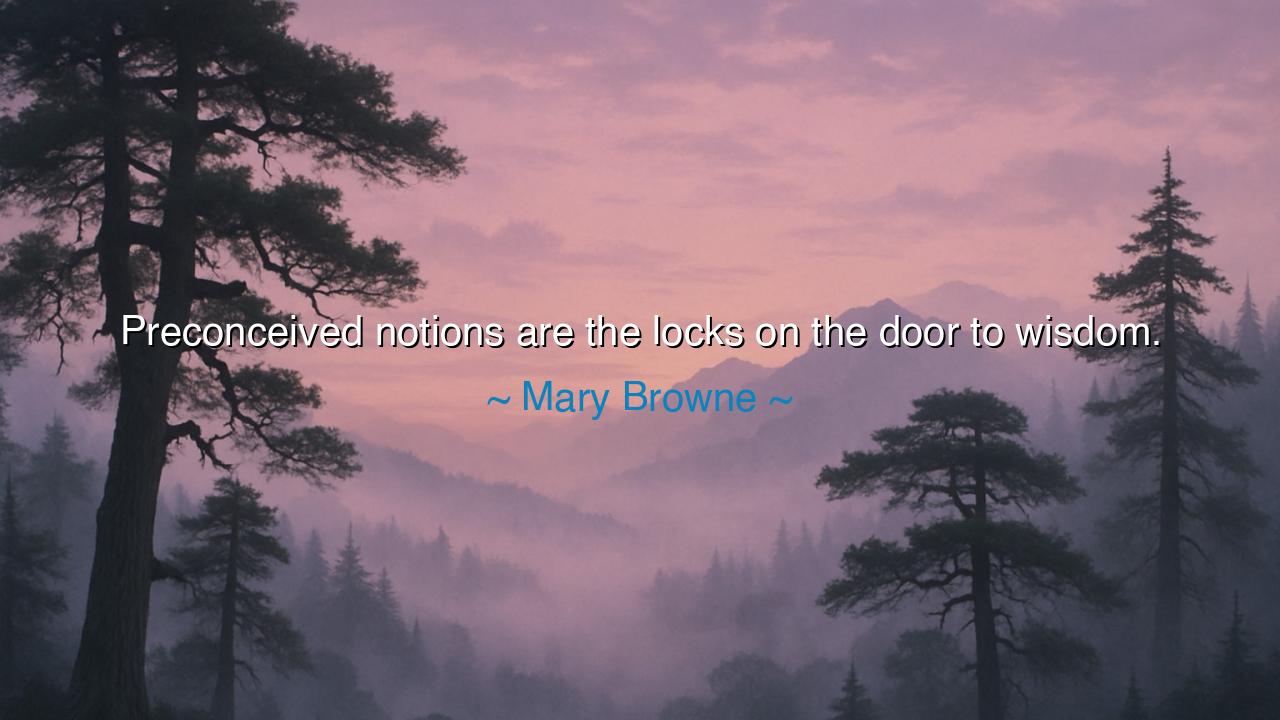
Preconceived notions are the locks on the door to wisdom.






Hearken, O children of discernment, to the timeless counsel of Mary Browne, who warns that preconceived notions are like locks on the door to wisdom. She teaches that when the mind is bound by assumptions, judgments formed without inquiry, or beliefs untested, it cannot enter the sanctuary of understanding. Herein lies a lesson for the ages: true wisdom demands openness, humility, and the courage to confront the unknown without the chains of prejudice.
The origin of this reflection is rooted in Browne’s life as an educator and thinker, devoted to the cultivation of intellect and moral discernment. Observing the habits of learners and leaders alike, she perceived that many failed to grasp profound truths because they clung to ideas unexamined, or refused to consider perspectives beyond their own. In her insight, the locks of preconceived notions are self-imposed barriers, and only deliberate reflection and openness can turn the key.
The meaning of this aphorism is profound: the human mind, though capable of great insight, is vulnerable to the prison of assumption. Preconceived notions distort perception, obstruct understanding, and blind the soul to new truths. To seek wisdom is to sweep away these obstructions, to cultivate curiosity, and to allow experience and reason to illuminate the path. Only when the locks are lifted does the mind perceive reality with clarity.
History provides vivid illustration. Consider Galileo Galilei, who challenged the long-held belief that the earth stood at the center of the cosmos. Despite the preconceived notions of both church and society, he persisted in observation and reason, ultimately revealing a truer understanding of the heavens. The locks that bound others to assumption could not contain the clarity of inquiry and the courage to pursue wisdom.
Moreover, this teaching extends beyond scholars to all who seek growth in life. The merchant, the healer, the leader, and the artisan all encounter the temptation to cling to familiar ideas or untested beliefs. Browne reminds us that the mind’s liberation comes only through reflection, humility, and the willingness to entertain the unfamiliar. Wisdom flourishes in those who sweep away assumptions and approach life with open eyes and an eager heart.
O generations yet unborn, take this counsel into your hearts: beware the preconceived notions that bind your judgment, and seek to unlock the door to understanding through inquiry, reflection, and courage. For in releasing the mind from the chains of assumption, you step into the light of true wisdom, where clarity, insight, and the eternal truths of existence await those who dare to see beyond the familiar.






BTBa Thien
This statement raises broader questions about societal structures. How do institutions, media, and traditions perpetuate preconceived notions that limit collective understanding? Are certain biases so ingrained that they require deliberate effort to overcome? It makes me reflect on the responsibility individuals and communities have in fostering environments that challenge assumptions, promote curiosity, and allow wisdom to flourish beyond the constraints of inherited or unexamined beliefs.
NHDao Nay H
Reading this, I feel inspired to reconsider my approach to disagreements and new ideas. It makes me question whether I truly listen to perspectives that conflict with my own or if I unconsciously impose mental locks. I also wonder whether there are cognitive or emotional strategies that can help dismantle these barriers, and how self-awareness interacts with empathy to enhance our capacity for wisdom.
KHNguyen Khanh Huyen
This idea prompts curiosity about the interplay between experience and openness. Can wisdom only emerge when we question assumptions, or does life experience sometimes reinforce them in productive ways? I also wonder whether intellectual humility is the key to unlocking understanding, and if so, how it can be cultivated systematically. The quote encourages reflection on the balance between confidence in what we know and willingness to be challenged.
YVNguyen Thi Yen Vy
I feel a sense of caution reading this quote. It raises questions about the dangers of overconfidence and closed-mindedness. How often do experts, leaders, or even everyday people fail to learn because they cling to prior beliefs? I also wonder whether some preconceived notions are necessary for functioning in daily life, and if so, how to distinguish between helpful frameworks and harmful barriers to wisdom.
HANguyen Tran Ha Anh
This statement sparks reflection on education and critical thinking. I question how societal norms, cultural conditioning, and early experiences create preconceived notions that act as barriers to insight. Is it possible to fully free oneself from these mental locks, or is the goal to recognize and mitigate their influence? It makes me curious about practical strategies for cultivating openness and receptivity to unfamiliar ideas.